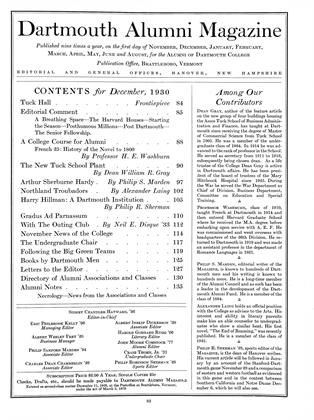• By Sydney A. Clark, '12. N. Y. McRride, 1930.
The Middle Ages may have joked about the possible overthrow of God by the Counts of Hapsburg, but any one who then prophesied the demise of the ancient empire at the hands of democracy would have been called a plain fool. The idea of a republic must make those same Counts turn in their graves. Yet here is a writer who, amid widespread political dissolution and social upheaval, is more or less apathetic to the inequalities created by the Treaty of Saint Germain and to the bouleversement occasioned by socialism. To be sure, the author is conscious of the new workingmen's apartments of Vienna, but it is the Vienna reminiscent of Franz Josef, Maria Theresa, and Napoleon that monopolizes his attention. How is such indifference possible? Simply because ancient Austria and those same Counts of Hapsburg are still in the ascendant. It is the castles, monasteries, and churches, laden with antiquity, which provide at once the reality and the glamor.
Ranke believed that there is in every people an embryonic idea of which its history is a necessary development. After reading this book of travel, what can one say is the idea to which Austria gives substance? Is it to be found in her architecture? But the author finds throughout Austria a strange juxtaposition of the Gothic, Renaissance, and baroque. Perhaps the Austrian character is but an expression of environment which glories in an eternal contrast between mountains (rising in the case of Gnoss Glockner to 12,500 feet) and valleys. In a land where "saints are as thick as cranberries on Cape Cod," perhaps that idea is mainly religious. Or perhaps the delicious coffee and spicy food served in Viennese cafes are the best marks of a distinctive culture. One half suspects, however, that the genius of a nation which has given to the world Mozart, Schubert, Beethoven, and the Strausses, to mention only a few, has flowered most exquisitely in music. Despite material impoverishment, music is today rated among the lower classes of Austria a "necessity."
The author is least successful when he hurries through Innsbruck or Salzburg noting museums and inns, most successful when he stops to admire the people and scenery of Liechtenstein and "undiscovered Carinthia." He makes the desire almost irrepressible to take a dip in one of Austria's warm lakes or to hire an apartment high up in the village of Hallstatt, overhanging a lake, for the price of $1.14 per day.
H. S. Card '11, editor of the Welding Engineer, is the author of "The Welding Industry" published by the Welding Engineer Publishing Company, Chicago, Illinois. This privately printed volume of 128 pages is profusely illustrated.
"Fox Huntin' Farmers," an Essay by Roger Warner '18, appears in the Summer 1930 issue of USA.
Eugene W. Gay-Tifft '23 has translated Knut Hamsun's "Vagabonds," published by Coward-McCann.
"The Narratives of the Indian Captivities," by Jason Almus Russell '2O, appears in Education (Boston), vol. LI, no. 2, October, 1930.
 View Full Issue
View Full Issue
More From This Issue
-
 Article
ArticleThe New Tuck School Plant
December 1930 By Dean William R. Gray -
 Article
ArticleDirectory of Alumni Associations and Classes
December 1930 -
 Article
ArticleArthur Sherburne Hardy
December 1930 By Philip S. Marden -
 Article
ArticleHarry Hillman: A Dartmouth Institution
December 1930 By Phil Sherman -
 Lettter from the Editor
Lettter from the EditorEditorial Comment
December 1930 -
 Class Notes
Class NotesCLASS OF 1923
December 1930 By Truman T. Metzel
Arnold K. Borden
Books
-
 Books
BooksAn Archivist Looks
February 1946 -
 Books
BooksBriefly Noted
JANUARY 1971 -
 Books
BooksChild Study and Child Training
August, 1916 By C.B.C. -
 Books
BooksCLINICAL TOXICOLOGY OF COMMERCIAL PRODUCTS. ACUTE POISONING (HOME AND FARM).
MARCH 1965 By Lours B. MATTHEWS JR. M.D. -
 Books
BooksSHIFTS OF BEING.
JULY 1968 By MARGARET BECK MCCALLUM -
 Books
BooksTHE FUTURE LIKE A BRIDE.
July 1958 By PAUL LAUTER



